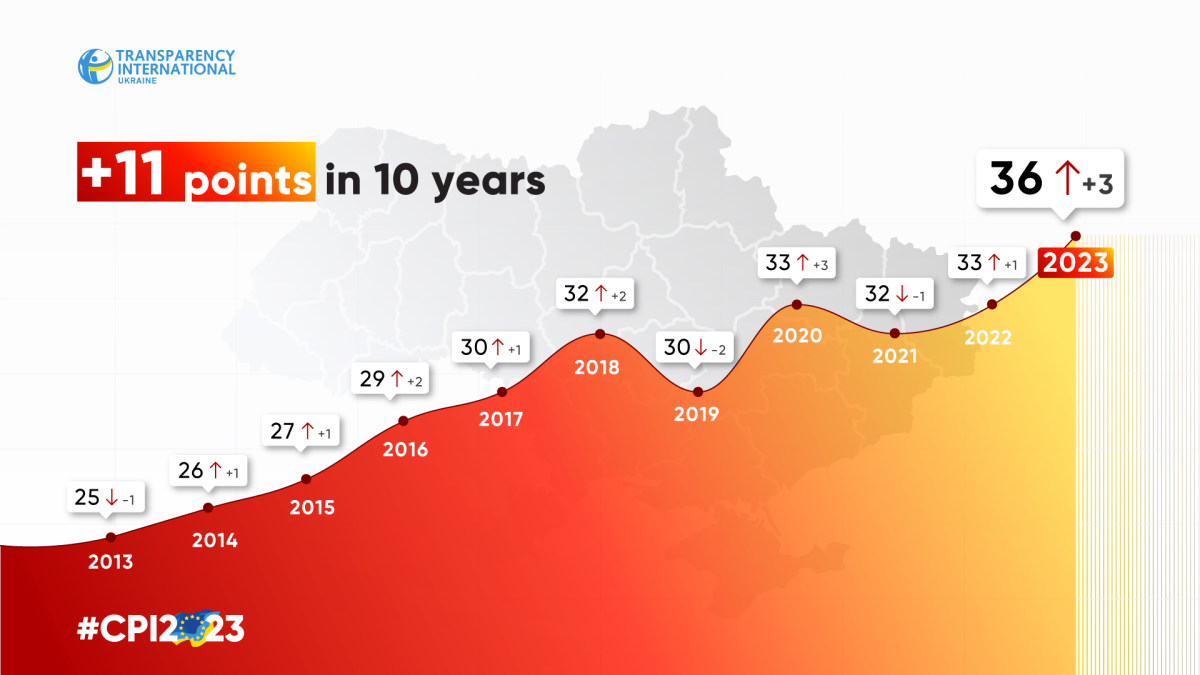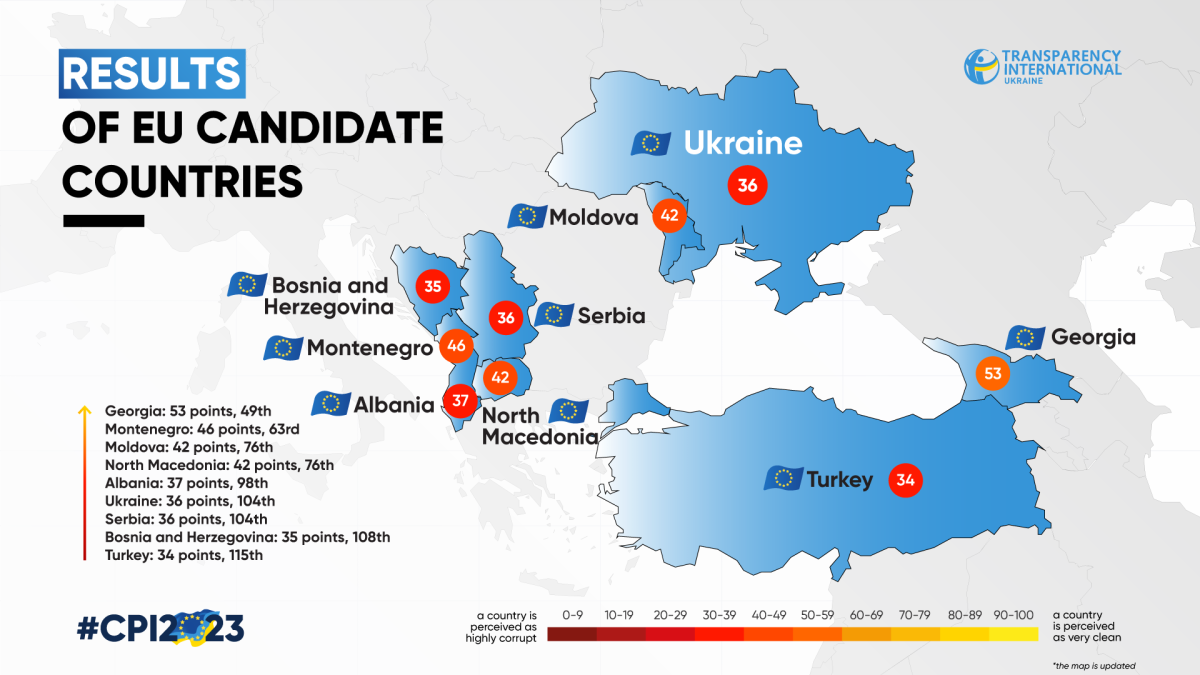

Ukraine scored 36 points out of 100 in the 2023 Corruption Perceptions Index (CPI); now our country ranks 104th out of 180 countries. Ukraine’s growth by 3 points is one of the best results over the past year in the world.
The information can be found on the website of Transparency International Ukraine.
Since the Revolution of Dignity, Ukraine has scored a total of 11 points over 10 years; this is the largest increase among the current EU candidate countries. However, we are still below the indicators of the European Union members.
Among the EU candidate countries in the Corruption Perceptions Index, Ukraine (36 points, 104th) and Moldova (42 points, 76th) scored the most over the past year— +3 points.
North Macedonia scored 2 points (42 points, 76th), while Montenegro (46 points, 63rd), Albania (37 points, 98th), and Bosnia and Herzegovina (35 points, 108th) scored 1 point each. Serbia’s results for 2023 did not change (36 points, 104th). Georgia, however, lost 3 points (53 points, 49th). Turkey closes the list of candidate countries, having lost 2 points (34 points, 115th).
In the dynamics over 10 years, Moldova improved its results by 7 points, Albania scored 6 points, and Georgia, having lost 3 points this year, scored 4 points in total in 10 years. Turkey has lost as many as 16 points over the decade.
The average score of the European Union countries is 64 points. Denmark has the highest result (90 points, 1st), and Hungary has the lowest (42 points, 76th). Bulgaria (45 points, 67th), Romania (46 points, 63rd), and Greece (49 points, 59th) are close to us in terms of points.
Since the Revolution of Dignity, Ukraine has scored a total of 11 points over 10 years; this is the largest increase among the current EU candidate countries. However, we are still below the indicators of the European Union members.
This study covers both the pre-war and the wartime period of Ukraine, from February 2021 to September 2023. It is during the war that the country had a significant increase in the indicator. In this time, key events took place: the intensification of arrests and investigations in high-profile corruption cases, the development of the State Anti-Corruption Program, carrying out most procurement transactions on Prozorro. However, the resumption of e-declaration and political parties reporting, legislative strengthening of the NABU and the SAPO did not make it into the studied period. In addition, part of the 2023 corruption scandals and January cases of pressure on journalists, as well as defense scandals, were not included in the study period.
“This result speaks of 3 facts. The first is that Ukraine has demonstrated a good result this year and progressive dynamics over 10 years. Now we have formally reached the indicators of the EU candidate countries, notes Andrii Borovyk, Executive Director of TI Ukraine. Fact Two: we have developed an anti-corruption ecosystem from scratch and already have real sentences for high-profile corruption, but we still need to work hard to catch up with the performance of the EU countries. And finally, if cases of pressure on journalists and members of the public continue, if the authorities interfere in various spheres of public administration, and the anti-corruption reform stalls, we might lose our achievements very quickly,” Andrii Borovyk, Executive Director of TI Ukraine, sums up the results of the study.
Now we have formally reached the indicators of the EU candidate countries. We have developed an anti-corruption ecosystem from scratch and already have real sentences for high-profile corruption, but we still need to work hard to catch up with the performance of the EU countries.
Andrii Borovyk
Therefore, this year, we suggest 3 comprehensive steps that will help improve the level of anti-corruption and contribute to the European integration processes of Ukraine in 2024.
2. Effectively use the assets of corrupt officials and accomplices of Russia for the needs of the state. Amend management selection procedures and conduct an independent audit of the ARMA’s activities. Increase the efficiency of asset management and sale. Improve confiscation mechanisms and the legal framework for asset recovery, aligning them with international standards. Improve the processes of blocking (pro-)Russian assets (as sanctions preceding confiscation) and introduce criminalization of sanctions circumvention.
3. Launch the reform of the Accounting Chamber and the State Audit Service of Ukraine. Develop and approve a draft law on reforming the Accounting Chamber and update the procedure for selecting its management and members. Prior to the legislative reform, the selection and appointment to the Accounting Chamber should be suspended. Shift the focus of the monitoring of public procurement by the State Audit Service from post-control to prevention. Monitoring and identifying significant violations should precede the conclusion of a contract to prevent losses and other negative consequences.
For reference
The Corruption Perceptions Index (CPI) is a ranking calculated by the global organization Transparency International since 1995. The organization itself does not conduct its own surveys. The Index is calculated based on 13 studies of reputable international institutions and think tanks.
The key indicator of the Index is the score, not the rank. The minimum score (0 points) means that corruption actually replaces the government, while the maximum (100 points) indicates that corruption is almost absent in society. The Index assesses corruption only in the public sector.
The CPI includes the perspective of business representatives, investors, market researchers, etc. . It reflects the private sector’s point of view and its perception of corruption in the public sector.
It is important to keep in mind that the CPI measures the perception of corruption, not the actual level of corruption. A higher score of one country compared to another does not mean that the former has less corruption than the latter; it means that the former is perceived as less corrupt.
The CPI methodology received a seal of approval from the European Commission for its reliable statistical approach.
The CPI covers the perception of corruption in the public sector by experts, including bribery, embezzlement of public funds, nepotism in the civil service, capture of the state, the government’s ability to implement integrity mechanisms, effective prosecution of corrupt officials, excessive bureaucracy, availability of adequate laws on financial disclosure, prevention of conflicts of interest and access to information, ensuring the protection of whistleblowers, journalists, and investigators.








